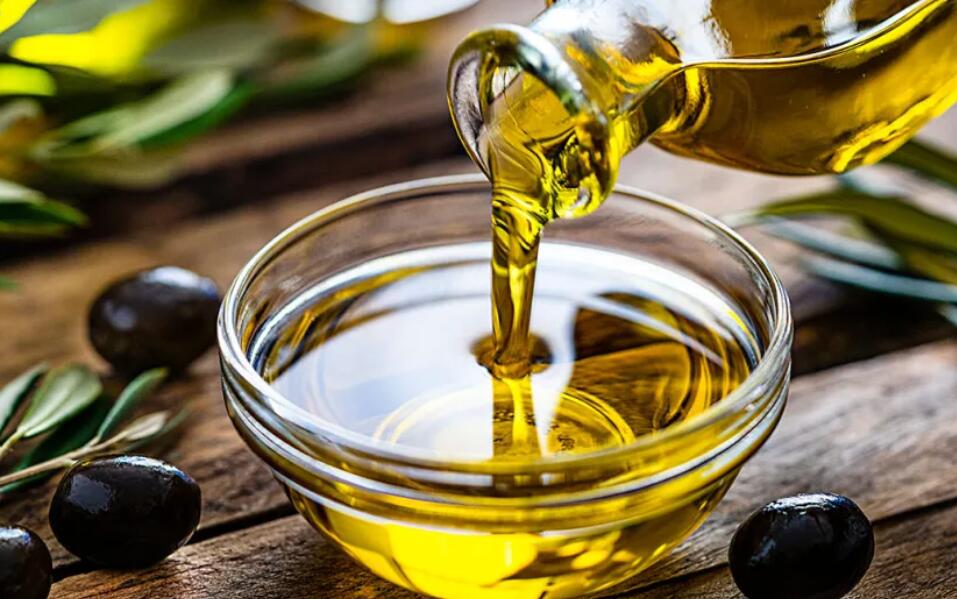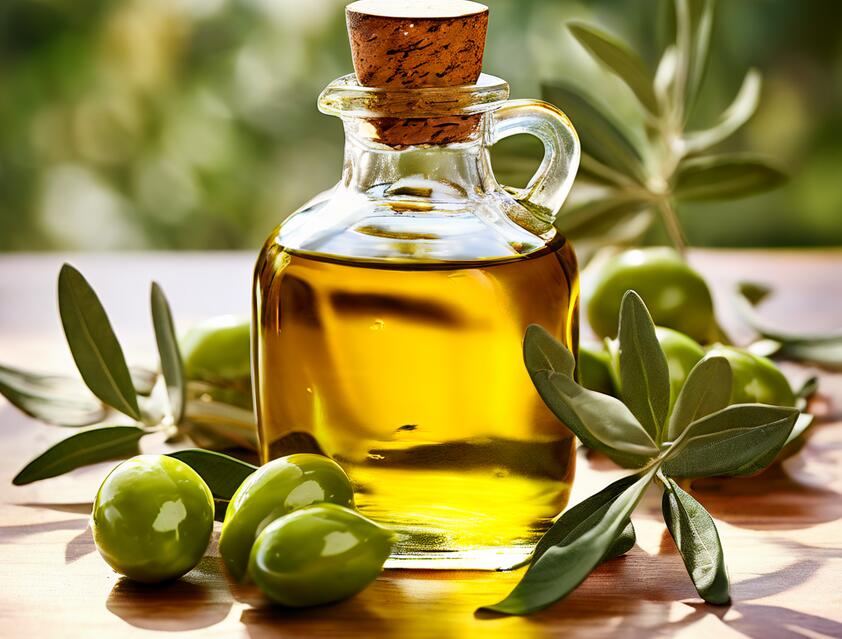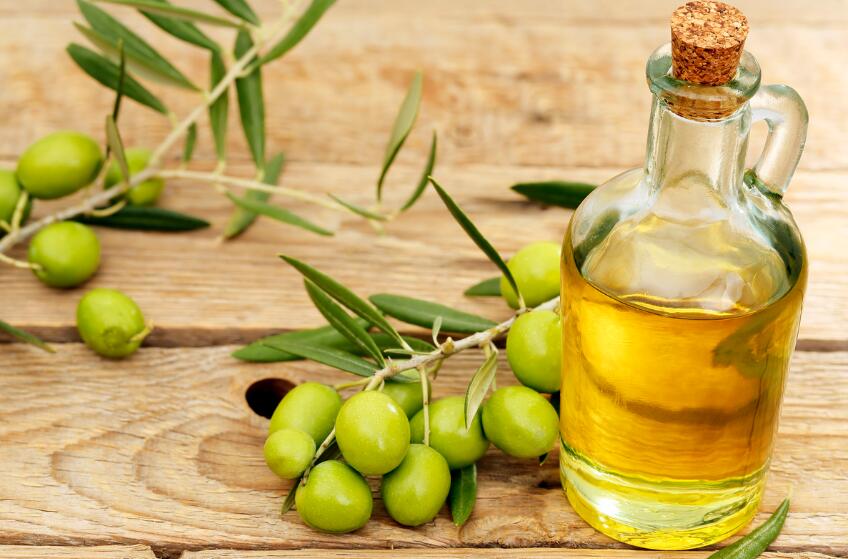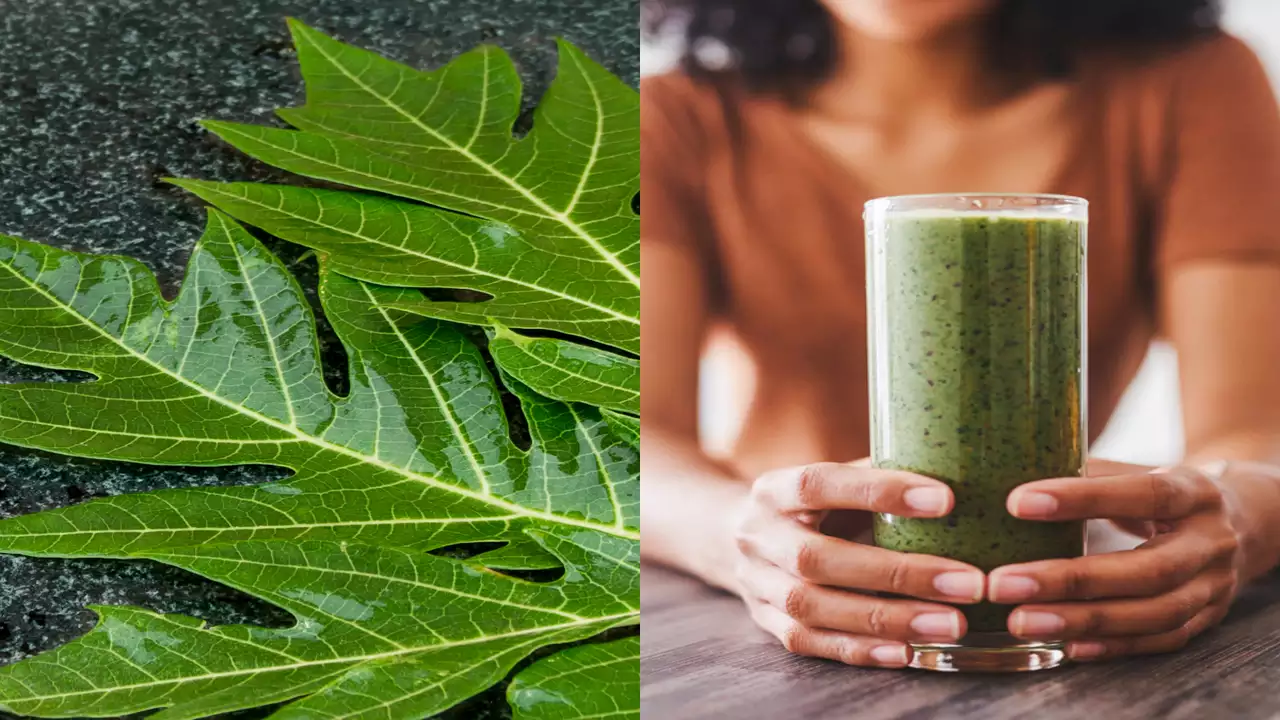HEALTH & LIFESTYLE
16 Benefits and Side Effects
Published
3 months agoon
By
1oo9t
Are you looking for a natural skincare solution that’s as effective as it is versatile? Look no further than olive oil! This liquid gold has been used for centuries to nourish and protect skin. It is Packed with antioxidants, vitamins, and essential fatty acids, which are beneficial for your face and skin. Whether you’re battling dryness, fighting aging, or simply looking for a natural way to enhance your skin’s health, olive oil will be the answer. In this article, we’ll explore the 16 benefits of olive oil for your skin and potential side effects…Click Here To Continue Reading>> …Click Here To Continue Reading>>
What is Olive Oil?
Olive oil is a liquid fat obtained by pressing whole olives, the fruit of Olea europaea. This is a traditional tree crop of the Mediterranean Basin. It’s primarily composed of oleic acid, a monounsaturated fatty acid. In addition, it is along with other beneficial compounds like polyphenols, vitamin E, and squalene.
There are different grades of olive oil, but for skincare purposes, extra virgin olive oil (EVOO) is considered the best. EVOO is the highest quality olive oil available. It is extracted using only mechanical methods without the use of heat or chemicals.
16 Benefits of Olive Oil for Face and Skin
1. Deep Moisturization: Say Goodbye to Dry Skin
Have you ever experienced that tight, uncomfortable feeling after washing your face? Next time, try patting a few drops of olive oil onto damp skin. You’ll be amazed at how soft and supple your skin feels throughout the day.
Olive oil is rich in fatty acids, particularly oleic acid, which makes up about 55-83% of olive oil. These fatty acids are similar to the oils naturally produced by our skin. This allows olive oil to blend seamlessly with our skin’s natural sebum.
Pro tip: For an extra moisture boost, you can try the “olive oil soak” method. After a warm shower, while your skin is still damp, massage a small amount of olive oil all over your body. The warmth from the shower will help the oil penetrate deeper into your skin.
2. Anti-Aging Powerhouse
Who doesn’t want to keep their skin looking youthful and radiant? Olive oil is rich in antioxidants, particularly vitamin E, which fights those pesky free radicals responsible for premature aging. It’s like having a tiny army of defenders protecting your skin from environmental stressors.
But the anti-aging benefits of olive oil don’t stop there. It also contains squalene, a compound that mimics our skin’s natural sebum. Squalene helps to boost skin elasticity and reduce the appearance of fine lines and wrinkles.
Want to take it a step further? You can try this DIY anti-aging face mask:
- Mix 1 tablespoon of olive oil with 1 teaspoon of honey and half a mashed avocado.
- Apply to clean skin and leave on for 15-20 minutes.
- Rinse with lukewarm water and pat dry.
This mask combines the anti-aging properties of olive oil with the hydrating power of honey and avocado. It’s like a spa treatment in your own home!
3. Soothing Inflammation: Calm and Collected Skin
If you’re prone to redness or irritation, olive oil might be your new best friend. Its anti-inflammatory properties can help soothe angry skin. It’s like a gentle pat on the back for your complexion.
Oleocanthal, the compound responsible for the “throat catch” when you taste strong olive oil, has anti-inflammatory effects similar to ibuprofen. This makes olive oil particularly beneficial for those with inflammatory skin conditions like eczema or rosacea.
Soothing Olive Oil Compress:
For localized areas of inflammation, you can try this simple remedy:
- Soak a clean cloth in a mixture of warm water and a few drops of olive oil.
- Apply the compress to the affected area for 5-10 minutes.
- Gently pat the skin dry and follow with a light layer of pure olive oil.
This can provide quick relief for irritated skin, sunburns, or even bug bites!
4. Natural Makeup Remover
Are you tired of harsh makeup removers that leave your skin feeling stripped? Olive oil to the rescue! Its ability to break down water-resistant substances makes it perfect for removing stubborn makeup. Plus, it’s gentle enough for the delicate eye area.
Mix equal parts olive oil and witch hazel for a natural, effective makeup remover that leaves your skin clean and moisturized. The olive oil breaks down the makeup while the witch hazel provides a gentle cleansing action. It’s a win-win!
Here’s a step-by-step guide to using olive oil as a makeup remover:
- Pour a small amount of olive oil onto a cotton pad.
- Gently press the pad against your closed eyelid for a few seconds to allow the oil to break down the makeup.
- Wipe away in gentle, downward strokes.
- Repeat if necessary for heavy or waterproof makeup.
- Follow with your regular cleanser to remove any residual oil.
Remember, a little goes a long way. You don’t need to drench your face in oil to get the job done!
5. Antioxidant Protection: Your Skin’s Shield
Living in a world full of pollutants and UV rays, our skin needs all the protection it can get. Olive oil’s high antioxidant content acts as a shield, protecting your skin from environmental damage. Think of it as your skin’s personal bodyguard!
The main antioxidants in olive oil are:
- Vitamin E (tocopherols)
- Polyphenols (including hydroxytyrosol and oleuropein)
- Phytosterols
- Squalene
These antioxidants work together to neutralize free radicals, which are unstable molecules that can damage skin cells and lead to premature aging. By incorporating olive oil into your skincare routine, you’re essentially giving your skin an extra layer of defense against daily environmental stressors.
Antioxidant Boost Serum: For an extra potent antioxidant treatment, you can mix a few drops of olive oil with vitamin C powder. Apply this mixture to your face before bed, and wake up to brighter, more protected skin. Just be sure to use it within 24 hours, as vitamin C can oxidize quickly when exposed to air.

6. Enhances Skin Elasticity
As we age, our skin loses its elasticity, leading to sagging and wrinkles. The vitamin E and polyphenols in olive oil stimulate collagen production, helping to maintain skin elasticity. It’s like giving your skin a mini workout, keeping it firm and bouncy.
Collagen is the protein responsible for giving our skin its structure and elasticity. As we age, our bodies produce less collagen, leading to the formation of wrinkles and sagging skin. The compounds in olive oil can help stimulate collagen production, helping to keep your skin looking firm and youthful.
Elasticity-Boosting Massage:
- Warm a few drops of olive oil between your palms.
- Starting from the center of your face, use upward and outward strokes to massage the oil into your skin.
- Pay extra attention to areas prone to sagging, like the jawline and cheeks.
- Finish by gently tapping your face with your fingertips to boost circulation.
Do this nightly before bed, and you might just notice a more lifted, toned appearance over time!
7. Antibacterial Properties
Struggling with acne or minor skin infections? Olive oil’s mild antibacterial properties can help combat these issues. It’s nature’s way of keeping your skin clean and clear.
The antibacterial properties of olive oil are primarily due to its polyphenol content, particularly a compound called oleuropein. These natural antibacterial agents can help fight off acne-causing bacteria, potentially reducing breakouts.
However, it’s important to note that olive oil is comedogenic. This means it can clog pores in some people. If you have oily or acne-prone skin, use olive oil sparingly and always do a patch test first.
For an occasional pimple, try this:
- Mix a drop of olive oil with a drop of tea tree oil (known for its potent antibacterial properties).
- Apply this mixture directly to the blemish using a clean cotton swab.
- Leave on overnight and rinse off in the morning.
Caution: If you have oily or acne-prone skin, use olive oil sparingly and always do a patch test first.
8. Nutrient-Rich Nourishment
Olive oil is like a multivitamin for your skin. Rich in vitamins A, D, E, and K, it provides essential nutrients that keep your skin healthy and glowing. It’s like serving your skin a gourmet meal every time you apply it!
Let’s break down these nutrients:
- Vitamin A: Promotes cell turnover and helps maintain healthy skin and hair.
- Vitamin D: Contributes to skin cell growth and repair.
- Vitamin E: A powerful antioxidant that protects skin cells from damage.
- Vitamin K: Helps with skin elasticity and wound healing.
In addition to these vitamins, olive oil also contains minerals like iron, calcium, and potassium. All of this plays a role in maintaining healthy skin.
9. Scar Reduction: Fade Away Those Marks
Whether it’s an old acne scar or a recent cut, olive oil can help fade those marks. Its vitamin E content aids in skin cell regeneration, promoting faster healing and reducing the appearance of scars. It’s like having an eraser for your skin imperfections. READ FULL STORY HERE>>>CLICK HERE TO CONTINUE READING>>>
The process works like this: Vitamin E helps to stimulate the production of new skin cells, which can help to “fill in” scars and even out skin tone. Additionally, the moisturizing properties of olive oil keep the skin supple, which can help prevent the formation of new scars.
Scar-Fading Treatment: For best results, try this routine:
- Cleanse the affected area thoroughly.
- Gently massage a small amount of olive oil into the scar for 5-10 minutes.
- Leave the oil on overnight if possible or for at least an hour.
- Repeat daily for several weeks to see improvement.
Remember, patience is key when it comes to scar treatment. It can take several weeks or even months to see significant improvement.
10. Sun Damage Recovery: After-Sun Care
While olive oil isn’t a substitute for sunscreen, it can be a soothing after-sun treatment. Its moisturizing and anti-inflammatory properties can help calm sun-kissed skin. Think of it as a comforting balm for those times you’ve stayed out in the sun a bit too long.
The antioxidants in olive oil, particularly vitamin E, can help neutralize the free radicals produced by UV exposure. This can help mitigate some of the damage caused by the sun. Additionally, the moisturizing properties of olive oil can help prevent peeling and keep your skin hydrated as it heals.
Cooling After-Sun Spray: Try this DIY spray for sunburned skin:
- Mix 1/4 cup olive oil, 1/4 cup aloe vera gel, and a few drops of peppermint essential oil in a spray bottle.
- Shake well and spritz onto sun-exposed skin for instant relief.
Remember, prevention is always better than cure. Always use a good sunscreen and limit your sun exposure to protect your skin from damage.
11. Lip Care: Soft, Supple Smiles
Don’t forget about your lips! A dab of olive oil can keep them soft and prevent chapping. It’s like a natural lip balm that’s probably already in your kitchen.
Our lips are particularly prone to dryness because they don’t have oil glands like the rest of our skin. Olive oil can help supplement this lack of natural oils. This keeps your lips moisturized and prevents them from becoming dry and cracked.
Mix olive oil with a bit of sugar for a gentle lip exfoliant that leaves your lips smooth and kissable.
- Mix 1 teaspoon of olive oil with 2 teaspoons of sugar.
- Gently rub the mixture onto your lips in circular motions.
- Leave on for a minute, then rinse off with warm water.
- Follow up with a light layer of pure olive oil for lasting softness.
Use this scrub once or twice a week for consistently smooth, soft lips.
12. Cuticle Care: Healthy, Happy Nails
Dry, ragged cuticles? Olive oil to the rescue! Massaging a drop into your cuticles can keep them moisturized and prevent hangnails. It’s like a mini manicure in a bottle.
The nourishing properties of olive oil can help strengthen your nails and soften your cuticles, promoting overall nail health. Plus, the massage itself stimulates blood flow to your nail beds. This can encourage faster, stronger nail growth.
Overnight Nail Treatment: Before bed, warm a small amount of olive oil and massage it into your nails and cuticles. For an extra boost, wear cotton gloves overnight to help the oil penetrate deeply. Wake up to softer cuticles and stronger nails!

13. Eczema and Psoriasis Relief: Soothe Troubled Skin
For those battling chronic skin conditions like eczema or psoriasis, olive oil can offer some relief. Its moisturizing and anti-inflammatory properties can help soothe irritated skin and reduce scaling. While it’s not a cure, it can be a comforting addition to your skincare routine.
The high oleic acid content in olive oil helps to improve skin barrier function, which is often compromised in conditions like eczema. This can help to lock in moisture and keep irritants out. Additionally, the anti-inflammatory properties of olive oil can help reduce redness and itching associated with these conditions.
Soothing Bath Oil: Add a quarter cup of olive oil to your bathwater for an all-over moisturizing treatment. The warm water will help the oil penetrate your skin, providing relief for dry, itchy patches.
14. Natural Exfoliant: Smooth Operator
When mixed with sugar or sea salt, olive oil becomes an excellent natural exfoliant. It gently removes dead skin cells while moisturizing, leaving your skin smooth and radiant. It’s like giving your skin a fresh start!
Exfoliation is crucial for maintaining healthy, glowing skin. It helps to remove dead skin cells, unclog pores, and stimulate cell turnover. When you combine sugar or salt with the moisturizing benefits of olive oil, you get a gentle yet effective scrub that leaves your skin soft and smooth.
DIY Body Scrub: Mix 1/2 cup olive oil with 1 cup sugar and a few drops of your favorite essential oil for a luxurious, skin-smoothing treat. Here’s how to use it:
- In the shower, gently massage the scrub onto damp skin in circular motions.
- Pay extra attention to rough areas like elbows, knees, and feet.
- Rinse thoroughly with warm water.
- Pat your skin dry and enjoy the smooth, moisturized feel!
Use this scrub once or twice a week for best results. Remember to be gentle – over-exfoliation can irritate your skin.
15. Strengthens Skin Barrier: Your Skin’s Fortress
Olive oil helps reinforce your skin’s natural barrier function, protecting it from environmental stressors and locking in moisture. It’s like building a fortress around your skin, keeping the good stuff in and the bad stuff out.
Our skin’s barrier is made up of lipids (fats) that help to keep moisture in and irritants out. The fatty acids in olive oil are similar to those found naturally in our skin, making it an excellent supplement to our skin’s natural barrier.
Barrier-Boosting Night Treatment: Before bed, mix a few drops of olive oil with your regular moisturizer. This will help seal in hydration and strengthen your skin barrier while you sleep. Wake up to plump, protected skin!
16. Promotes Overall Skin Health: Glow from Within
Last but not least, the regular use of olive oil can contribute to overall skin health. Its combination of vitamins, antioxidants, and fatty acids work together to nourish, protect, and rejuvenate your skin. It’s like giving your skin a daily dose of TLC.
When used consistently as part of a balanced skincare routine, olive oil can help:
- Improve skin texture
- Even our skin tone
- Boost radiance
- Reduce the appearance of fine lines and wrinkles
- Maintain skin elasticity
Olive Oil Glow Boost: For an instant glow, try this quick trick:
- Mix a drop of olive oil with your foundation or tinted moisturizer.
- Apply as usual for a dewy, radiant finish.
This works especially well for those with dry or mature skin types!
Precautions and Potential Side Effects
While olive oil is generally safe for most skin types, there are a few things to keep in mind:
- Comedogenic for Some: Olive oil can clog pores in some people, especially those with oily or acne-prone skin. Always patch test first.
- Allergies: Some people may be allergic to olive oil. If you experience any redness, itching, or swelling, discontinue use immediately.
- Not a Sunscreen: While olive oil has some natural SPF, it’s not enough to protect against harmful UV rays. Always use proper sunscreen.
- Quality Matters: Low-quality or adulterated olive oils may contain additives that could irritate your skin. You should stick to high-quality, pure olive oil.
Frequently Asked Questions
1. Can I use olive oil on my face every day?
While olive oil is generally safe for most skin types, daily use may not be suitable for everyone. If you have oily or acne-prone skin, using olive oil daily could potentially clog pores. For dry or mature skin, daily use might be beneficial. Start by using it a few times a week and see how your skin responds. Always listen to your skin!
2. Is it safe to use olive oil around my eyes?
Yes, olive oil is generally safe to use around the eye area. In fact, it can be an effective and gentle eye makeup remover. However, be careful not to get it directly in your eyes, as this can cause temporary blurred vision.
3. How do I know if I’m allergic to olive oil?
To check for an allergic reaction, perform a patch test. Apply a small amount of olive oil to the inside of your wrist and wait 24-48 hours. If you experience redness, itching, or swelling, you may be allergic. Discontinue use and consult a dermatologist.
4. Can I use any olive oil from my kitchen for skincare?
While you can use kitchen olive oil, it’s best to use extra virgin olive oil (EVOO) that’s organic and cold-pressed for skincare purposes. This ensures you’re getting the highest quality oil with the most beneficial compounds intact.
5. How long does it take to see results when using olive oil on my skin?
This can vary depending on your skin type and the specific concern you’re addressing. For immediate benefits like moisturization, you might notice results right away. For issues like scar reduction or anti-aging effects, it could take several weeks of consistent use to see noticeable results.
6. Can I use olive oil if I have sensitive skin?
Olive oil can be good for sensitive skin due to its anti-inflammatory properties. However, as with any new skincare product, it’s crucial to do a patch test first. If you have specific skin conditions, consult with a dermatologist before incorporating olive oil into your routine.
Related
You may like
HEALTH & LIFESTYLE
10 Surprising Ways Pawpaw Leaves Can Be Life-Saving That You Might Not Be Aware Of
Published
5 days agoon
October 12, 2024By
1oo9t
Seed And Herbs Natural Product will by no means relaxation till the real power of our herbs will unfold world wide. From the beyond few weeks, many has been requesting this and now right here we go. Don’t neglect about to unfold it out too with one shear additionally display which you like it
Nutritional information of pawpaw departThe inexperienced papaya leaf is A repository of nutrition A, C, E, K, B Along with minerals calcium, magnesium, iron, sodium, except enzymes including papain and chymopapain; alkaloid compounds Like karpain…Click Here To Continue Reading>> …Click Here To Continue Reading>>
Naturally, the papaya leaf is used to remedy many diseases. Its juice works wonders. Let’s listing out a number of the first rate fitness advantages of papaya leaf juice for you:
1. Excellent remedy for dengue: Dengue which is thought to reason a steep lower withinside the platelet be counted number in our blood, may be miraculously dealt with with papaya leaf juice. Have 25 ml of papaya leaf juice in water two times an afternoon to assist your body generate platelets in enormous quantity to fight the dengue fever and get your body healthier. .
2. Beneficial for liver: Improve your liver functioning with papaya leaf extract. The juices’ recovery properties have the ability to remedy one from persistent liver diseases- jaundice, liver cirrhosis; most cancers. It obviously detoxifies the liver, and cleanses the toxins from the liver. To do this, get a handful of fresh pawpaw leave and wash them thoroughly with salty water. Squeeze the pawpaw leave in a bowl of smooth water.
3. Improves pores and skin, hair: Applying papaya juice to your body looks after dry, flaky pores and skin. It acts as a herbal moisturizer, reduces pimples, acne; prevents extra oil secretion. And for the hair, the juice aids in hair growth, alleviates dandruff, flaky scalp, thereby offering a remarkable set of mane.
For effectiveness, grind each the seed and fresh leave of pawpaw and observe it acne and pimple. Allow it at the pores and skin for 30min to an hour wash it away.
four. Cures malaria: The leaf’s juice has acetogonin compound that works efficaciously to deal with malaria. Its plasmodiastatic properties in a roundabout way manipulate malaria fever. To do this, get a handful of fresh pawpaw depart and wash them thoroughly with salty water. Squeeze the pawpaw leave in a bowl of clean water.
5. Controls diabetes and boosts digestion: The juice’s medicinal belongings allows beautify insulin sensitivity and alter blood sugar levels. It reduces oxidative stress, prevents kidney damage.
And its enzymes work wonders for stomach ulcers, indigestion and hold bloating at bay. To do this, get a handful of clean pawpaw leave and wash them thoroughly with salty water. Squeeze the pawpaw leave in a bowl of clean water.
6. Reduces Cancer RisksExtracts from papaya leaf boasts of remarkable anti-most cancers homes majorly due to its compound acetogenin. According to the study carried through the journal of Ethnopharmacology, the enzymes in papaya leaf can fight liver most cancers, lung cancer, pancreatic cancer and breast cancer.
The anti inflammatory homes of papaya leaf can also be useful in lowering irritation and chemotherapy facet effects.If the bitterness of the leaves hassle you, you could additionally blend the juice with different juices like that of coconut. So don’t keep your self back from gaining those advantages and take hold of a few now.
7.Another first rate benefit of papaya leaf juice is its capacity to combat viral contamination including the common bloodless virus. It is a herbal manner of regenerating white blood cells and platelets. Papaya leaves include over 50 components consisting of the nutrients A, C and E that aid the immune system. READ FULL STORY HERE>>>CLICK HERE TO CONTINUE READING>>>
8. Fresh papaya leaves boiled with sliced portions of orange resource in burning fats as papaya leaf juice is a really perfect lowering agent.
9. Papaya leaf juice is powerful in relieving menstrual pain. For this purpose, take 1 papaya leaf, add tamarind and salt, mix with a glass of water and boil. Drink this concoction after cooling it for relief.
10. How to Make Papaya Leaf Juice for regular routeing
Since the papaya leaf juice is pretty sour in taste, it could be blended with different fruit juices. You can put together papaya leaf juice at domestic through following the given steps.
Take numerous medium sized papaya leaves which can be washed and partially dried. Cut them and place them in a sauce pan with round 2 liters of water.
Boil the water and leaves, and simmer with out a lid till the water is reduced to half.
Now pressure the liquid and keep it in glass containers. It may be refrigerated and saved for three to four days. But fresh juice is continually preferable.
The juice have to be discarded if it turns into cloudy.
Alternatively, the juice may be squeezed through crushing the papaya leaves after doing away with the stems and different fibrous parts.
Important notice
Although this juice is extraordinarily beneficial, it have to mainly be avoided through pregnant girls as it could result in abortion. Moreover, it have to now no longer be fed on with any thyroid stimulators or Co-enzyme Q10
Related
HEALTH & LIFESTYLE
Things that happen to a man’s brain when he cheats on his wife.
Published
5 days agoon
October 12, 2024By
1oo9t
Though some people don’t view being non-monogamous as that big of a deal and don’t believe that their relationship will suffer if either they or their partner cheats, for others, finding out that their partner cheated on them can feel like all of the air is being sucked out of the room. Lots of people wonder why others cheat, and if your partner cheated on you, you might be especially curious as to their reasoning…Click Here To Continue Reading>> …Click Here To Continue Reading>>
But there are actually changes that happen in a man’s brain when he cheats or before he cheats that might explain what’s going on. That being said, in science, there’s a difference between correlation and causation, so just because your partner has some of these things or experiences some of these things doesn’t necessarily mean that he’s definitely going to cheat, it just might make him more susceptible to doing so.
When you find out that your partner has cheated, however you may define it, it’s not unusual to feel at least a smidgen of temporary betrayal at some point. You also might have a lot of questions about their motivation and reasoning, how it all went down, why that person, and more. Though you and your partner may or may not ever talk in detail about those things, and though your relationship might not make it, understanding some of what might be going on in their brain before and when your partner cheats is still something about which you may want to know more. Even if it only serves to satisfy your own curiosity.
1.Their Dopamine Receptor Gene Is Longer
As it turns out, there might actually be some genetic factors that explain more about what’s going on in a man’s brain when he cheats. A certain study found that those who had a long allele version of the dopamine D4 receptor gene were more likely to report that they had cheated on their partner in the past. Dopamine is a neurotransmitter that’s typically associated with pleasure and this particular genetic variation could potentially be more likely to be present in those who cheat.
2.Once They Cheat Once, They Feel Less Guilty When They Cheat Again
Cheating occurs for so many different reasons and there are many different factors that can influence someone’s likelihood of cheating. But once you cheat the first time, you might be more likely to cheat again. Over time, your brain gets more used to lying, which makes it easier for you to be deceptive each time you do it.
3.They Have Lower Levels Of Monoamine Oxidase A
If your partner is someone who values unique experiences, competition, and power, they might fall under the category of people known as “sensation seekers. This group of people tend to have lower levels of monoamine oxidase ends to have lower levels of monoamine oxidase A — the enzyme that helps dictate the levels of dopamine that are in your brain. Because of this, they might be more likely to seek out experiences like affairs and additional partners. READ FULL STORY HERE>>>CLICK HERE TO CONTINUE READING>>>
4.They Have A Certain Type Of Vasopressin Receptor
A scientific research found a connection between partners who reported lower levels of satisfaction in their marriage and men with a certain type of vasopressin receptor. This doesn’t mean that every man with that kind of vasopressin receptor gene will cheat or otherwise have a terrible marriage, however. Again, there are a number of different factors that influence these complicated issues and just because researchers found a connection between these things doesn’t necessarily mean that one causes the other.
5.They Have Higher Levels Of Testosterone
Testosterone levels could also potentially play a role. Studies have found that people who tend to cheat on their partners also tend to have higher levels of testosterone than those who stay monogamous. This doesn’t mean that higher testosterone is what made them cheat, but it could be possible that this biological difference may have played a role.
6.They Lose Their Ability To Manage Risk Because It Doesn’t Seem Like As Much Of A Risk
If your partner takes a lot of risks in general or has cheated without their partner knowing before, that might affect how they think about cheating.
Cheating on your partner isn’t OK, but there are some biological factors that might make you more prone to doing so. Still, your decision of whether you’re going to cheat on them or not plays a central role. It’s important to remember that you or your partner still have to ultimately take responsibility for your actions, whatever they may be.
Related
HEALTH & LIFESTYLE
What Causes Too Much Mucus In Your Throat And What To Do About It
Published
5 days agoon
October 12, 2024By
1oo9t
Excess mucus in the throat can be uncomfortable and irritating, and it is usually the result of various underlying factors. Mucus is a protective substance produced by the body to trap dust, allergens, and other harmful particles, but when it becomes excessive, it can lead to a feeling of congestion, frequent throat clearing, and difficulty swallowing. Understanding the causes and solutions for too much mucus in the throat is key to finding relief.
Causes of Excess Mucus in the Throat**
1. Postnasal Drip: One of the most common causes of excess mucus is postnasal drip. This occurs when the mucus that is normally produced in the nose drips down the back of the throat. Allergies, sinus infections, and irritants like smoke or pollution can trigger this condition, leading to constant throat clearing and coughing…Click Here To Continue Reading>> …Click Here To Continue Reading>>
2. Gastroesophageal Reflux Disease (GERD): Acid reflux or GERD can cause stomach acid to back up into the esophagus and throat, leading to irritation and excessive mucus production. This often occurs after eating, especially with foods that are spicy, acidic, or high in fat.
3. Infections: Viral and bacterial infections, such as the common cold, flu, or sinusitis, can cause an increase in mucus production. When the body is fighting off an infection, the mucus serves to protect and clear the throat and airways.
4. Smoking and Pollution: Smoking and exposure to environmental pollutants can irritate the lungs and airways, leading to excess mucus. In smokers, the body tries to clear the irritants by producing more mucus in the respiratory tract.
5. Dehydration: Not drinking enough water can lead to thickened mucus, making it more noticeable and harder to swallow. Staying hydrated helps thin out mucus, allowing it to move through the throat more easily.
What to Do About It READ FULL STORY HERE>>>CLICK HERE TO CONTINUE READING>>>
1. Stay Hydrated: Drinking plenty of water throughout the day can thin mucus and help it move out of the throat more efficiently. Warm liquids like herbal teas can be particularly soothing.
2. Use a Humidifier: Dry air can make mucus thicker and more uncomfortable. Using a humidifier in your home can add moisture to the air, which helps to thin mucus and reduce irritation in the throat.
3. Avoid Irritants: Reducing exposure to allergens, smoke, and pollutants can help prevent excessive mucus production. If you smoke, consider quitting, as smoking is a major cause of excess mucus.
4. Manage Acid Reflux: If GERD is the underlying cause, lifestyle changes such as eating smaller meals, avoiding trigger foods, and not lying down immediately after eating can help reduce acid reflux and mucus buildup.
5. Use Over-the-Counter Remedies: Saline nasal sprays or decongestants can help alleviate postnasal drip, while lozenges or gargling with salt water can soothe the throat and reduce mucus.
If excess mucus persists for more than a few weeks or is accompanied by other concerning symptoms, it’s advisable to consult a healthcare professional to rule out more serious conditions.
Related
Trending
-

 SPORTS3 months ago
SPORTS3 months agoLevante closes the return of Vicente Iborra
-

 METRO3 months ago
METRO3 months agoElderly man shared his stunning experience with the afterlife ‘after being brought back from the other side’!
-

 SPORTS4 months ago
SPORTS4 months agoEuro 2024: the French team officially qualified for the round of 16
-

 SPORTS3 months ago
SPORTS3 months agoLithuania’s Rokas Jokubaitis to Play in NBA Summer League with New York Knicks After Olympic Qualification Disappointment
-

 METRO3 months ago
METRO3 months agoArmy Captain Returns Home Then He Finds His Daughter Sleeping on the FLOOR! –
-

 METRO4 months ago
METRO4 months agoParents had no hope for their daughter’s survival, ‘then the doctor delivered staggering news’!
-

 SPORTS3 months ago
SPORTS3 months agoNovak Djokovic: Deceptive Recovery at Wimbledon
-

 SPORTS3 months ago
SPORTS3 months agoOlympic Games in Paris: German handball players win against Spain and reach quarter-finals
